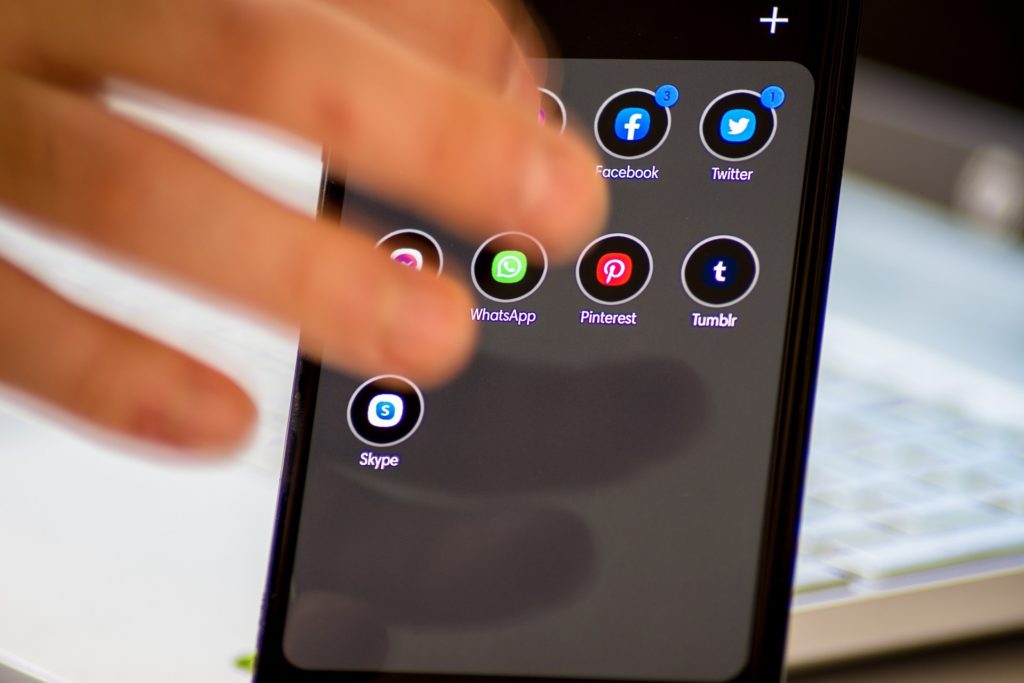
Contributor: Staff at Sierra Tucson
The COVID-19 pandemic has meant more time inside, more time on social media, less time seeing friends, families, and coworkers in person, and — in many cases — an increase in feelings of isolation. U.S. adults were already spending more than 12 hours a day with overlapping digital media use prior to the pandemic, an average that went above 16 hours a day as of August [1].
A decent chunk of that time is spent on social media. Social management platform Hootsuite estimates that the typical user spends an average of 2 hours, 25 minutes each day on social media, which equates to roughly one waking day of their life each week [2].
A social media habit that can be more harmful than helpful
Spending so much time on social media can lead to a variety of negative outcomes, including low self-esteem, poor sleep, and an increase in stress and anxiety. Some experts have coined the term “social media addiction,” and while this isn’t a condition you’ll find in the DSM-5, it can produce some of the same responses in the brain that an addiction to alcohol or other drugs can have.
Call Sierra Tucson for Help 844-203-4784
“People get a sense of social well-being ― it’s as though they’re interacting with somebody, like they’re interacting with friends,” Cleveland Clinic psychologist Joseph Rock said [3]. “Researchers find people who are really heavy users develop a tolerance to that feeling, so they need more and more exposure to get the same effect. What does that sound like? Drug and alcohol use.”
Not every expert feels that excessive use of social media falls on the spectrum of addiction, but it’s widely accepted that it and isolation often go hand in hand. Spending too much time on social platforms can create a disconnect and prevent users from experiencing authentic emotions.
"All addictions operate on the variable-reward system," said Ofir Turel, Ph.D., associate professor of information systems and decision sciences at the College of Business and Economics at California State University, Fullerton [4]. "We have observed that the reward system (in the brain) is more active and more sensitive in people who present symptoms of addiction to social media.”
Researchers at the University of Pittsburgh School of Medicine studied more than 1,700 young adults who use platforms like Facebook, Twitter, and Snapchat. They found that those who spent more than two hours a day on social platforms were twice as likely to have perceived social isolation than those who spent 30 minutes or less [5].
“We do not yet know which came first — the social media use or the perceived social isolation,” professor Elizabeth Miller, one of the study’s senior authors, said. “It’s possible that young adults who initially felt socially isolated turned to social media. Or it could be that their increased use of social media somehow led to feeling isolated from the real world.”
The loneliness of addiction and the roles of isolation and social media
 As Miller stated, with social media and isolation, it’s a question of which comes first. In the case of addiction to alcohol or other drugs, we know that isolation can lead people who are already struggling with substance use down a more dangerous path.
As Miller stated, with social media and isolation, it’s a question of which comes first. In the case of addiction to alcohol or other drugs, we know that isolation can lead people who are already struggling with substance use down a more dangerous path.
Even if we can’t always draw the conclusion that isolation leads to addictive behaviors, we do know that spending an excessive amount of time on social media can lead to isolation, as the University of Pittsburgh study notes. That can result in an increase in anxiety, depression, and other mental health disorders that can often co-occur with addiction.
"What we know at this point is that we have evidence that replacing your real-world relationships with social media use is detrimental to your well-being," said Holly Shayka, an assistant professor in the division of global public health at the University of California San Diego [6]. "Where we want to be cautious ... is when the sound of a voice or a cup of coffee with a friend is replaced with 'likes' on a post.”
As experts continue to conduct studies about the addictive qualities of social platforms, some have found that the brain’s self-control system remains largely intact in those spending too much time online, whereas researchers studying addiction often find deficits in that self-control.
"If people have a strong enough motivation to control their social platform use, they can," Turel said. “For example, if Facebook began charging users $200 an hour, most people would be able to reduce their use. By comparison, a drug like cocaine impairs self-control, and breaking an addictive pattern is harder to do.”
What to watch out for social media addiction
Though the pandemic has certainly made in-person socialization more complicated, it’s not impossible. If you’ve found yourself avoiding interactions with others in order to spend excessive time on social media — pre-pandemic or currently — it might be time to address those habits.
Some differences between what started as a hobby and what could become an addiction include:
Restlessness and irritability if not using social media
Increased reliance on social media to cope with problems
Being distracted by social media while socializing with friends or family
Achieving a healthier balance is possible, whether that means deleting apps from your phone, setting a dedicated time for social media use each day, or avoiding social media usage before bed.
But sometimes, that’s easier said than done. If you find yourself struggling with addictive or compulsive behavior, professional treatment can help you work through the symptoms you’re experiencing and achieve successful, long-term recovery.
References:
[1] Wolf, M.J. (2020, Aug. 7). How Covid-19 has transformed the amount of time we spend online. The Wall Street Journal. Retrieved from: https://www.wsj.com/articles/how-covid-19-has-transformed-the-amount-of-time-we-spend-online-01596818846.
[2] Kemp, S. (2021, Jan. 27). 15.5 users join social every second (and other key stats to know). Hootsuite. Retrieved from: https://blog.hootsuite.com/simon-kemp-social-media/.
[3] The Cleveland Clinic. (2019, March 1). Is it possible to become addicted to social media? Retrieved from: https://health.clevelandclinic.org/is-it-possible-to-become-addicted-to-social-media/.
[4] Ricci, J. (2018, June 28). The growing case of social media addiction. The California State University. Retrieved from: https://www2.calstate.edu/csu-system/news/Pages/Social-Media-Addiction.aspx.
[5] The Australian Foundation for Mental Health Research. (n.d.). Social media can increase feelings of isolation. Retrieved from: https://affirm.org.au/social-media-can-increase-feelings-of-isolation/
[6] Hobson, K. (2017, March 6). Feeling lonely? Too much time on social media may be why. National Public Radio. Retrieved from: https://www.npr.org/sections/health-shots/2017/03/06/518362255/feeling-lonely-too-much-time-on-social-media-may-be-why.
About Our Contributor:
 Located in Tucson, Arizona, Sierra Tucson is the nation’s leading residential and outpatient treatment center for substance use disorders, trauma-related conditions, chronic pain, mood and anxiety disorders, and co-occurring concerns. We provide integrated, holistic care for adults age 18 and older of all genders, including specialized programs for military members, first responders, and healthcare workers. Sierra Tucson was ranked No. 1 in Newsweek’s list of Best Addiction Treatment Centers in Arizona for 2020.
Located in Tucson, Arizona, Sierra Tucson is the nation’s leading residential and outpatient treatment center for substance use disorders, trauma-related conditions, chronic pain, mood and anxiety disorders, and co-occurring concerns. We provide integrated, holistic care for adults age 18 and older of all genders, including specialized programs for military members, first responders, and healthcare workers. Sierra Tucson was ranked No. 1 in Newsweek’s list of Best Addiction Treatment Centers in Arizona for 2020.
The opinions and views of our guest contributors are shared to provide a broad perspective of addictions. These are not necessarily the views of Addiction Hope, but an effort to offer a discussion of various issues by different concerned individuals.
We at Addiction Hope understand that addictions result from multiple physical, emotional, environmental, and genetic factors. If you or a loved one are suffering from an addiction, please know that there is hope for you, and seek immediate professional help.
Published on April 26, 2021
Reviewed by Jacquelyn Ekern, MS, LPC on April 26, 2021
Published on AddictionHope.com
